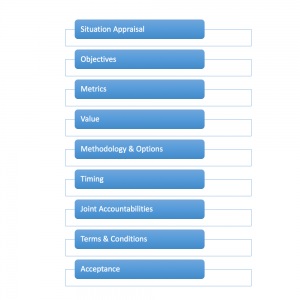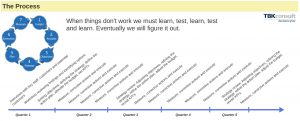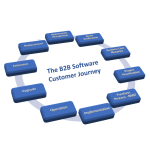How to Deliver Winning Proposals – Part 10
 In this series of posts I am sharing why at the beginning of my consulting career I lost too many proposals and what I have done to fix it. Links to previous posts in the series are listed at the end of this post.
In this series of posts I am sharing why at the beginning of my consulting career I lost too many proposals and what I have done to fix it. Links to previous posts in the series are listed at the end of this post.
The proposal is the very last stage of the management consulting sales process. It is the confirmation of what we have already agreed during our discussions with the client. If you make the proposal too early in the sales process then the probability of loosing the business will increase substantially. There should be nothing in the proposal that comes as a surprise to the client.
This post is about the sixth section of the proposal: Timing.
Alignment of Interests
Let me start with repeating some fundamentals explaining why we cannot have an open-ended project.
Management consultants should never work on a Time & Material basis.
If the objective of the consulting project is to make improvements to the client’s situation enabling her to deliver better performance in the future, then the client wants to achieve these objectives as soon as possible and with as little effort and disturbance as possible. The sooner the better.
If you work on a Time & Material basis, then your short-term interest is to take as long as possible and use as many hours as possible. The later the better.
I am sure you will claim that you would never put you own your short-term interests over your client’s long term interests. Maybe you will not, but your client will always be alert and will keep an eye on your monthly invoices. Whenever you suggest a change or an addition your client will be hesitant as she knows it will increase the bill. Will she question your motives for suggesting the change?
My best advice: Stay away from Time & Material.
Timing challenges
How long will it take to improve the client’s situation?
We can obviously determine when to start, but how will we know when the project has been completed?
If you have read the previous posts you will have learned that I recommend management consultants to move away from input based assignments and teach your potential clients to focus on output, value and results. While this is in the best interest of the clients and for us, it does introduce uncertainty about the time required.
Facilitating a strategy workshop (input type of project) is very easy timing. It takes 5 days to prepare, 3 days to facilitate and 2 days to write the conclusions. We can start the first Monday in April and deliver the report by the end of April. Job accomplished.
Increasing sales productivity, reducing customer churn or entering a foreign market (output type project) are not that easy to time.
Introducing Phases
I was with a potential client just recently who needs help with entering foreign markets. The client had opened an office in the UK, but they hadn’t been able to sell anything. The pipeline looked healthy, but deals kept slipping. How could we help fix the issues?
This scenario resembles a patient going to the doctor with a serious health problem and the ambition of winning a gold medal at the next Olympic  Games. Possible? Maybe, but we need to make a thorough health check first, including blood tests, x-rays and probably many other tests (I am not a medical doctor). Then we need to map the path to the Olympic Gold medal. We need to assess what it will take in terms of a training program, financial resources and the competitive environment. After the “initial” assessment we can embark on the journey.
Games. Possible? Maybe, but we need to make a thorough health check first, including blood tests, x-rays and probably many other tests (I am not a medical doctor). Then we need to map the path to the Olympic Gold medal. We need to assess what it will take in terms of a training program, financial resources and the competitive environment. After the “initial” assessment we can embark on the journey.
We have four years to the next Olympic Games. The final result will be the outcome of the final 100 meter sprint that will take less than 10 seconds. However, we know that we must train every day and steadily improve our performance. We must win smaller competitions and then bigger competitions to qualify for the Olympic Games. There will be 1.000 obstacles on the way. Some of them foreseeable (injuries, fatigue and competitors) and some of them unforeseeable (divorces and accidents).
When the objectives and the results are very far away then we have to introduce phases.
The objective of this particular project is not just to get some revenue in the UK. The objective is to get to 20% of the UK market in the specific market segment. Maybe it will take 10 years to get there, but unless you are among the top three in a market you may as well stay away. Being number four, five or lower in a market means high cost of sales and an unpredictable deal flow. Getting to 20% means first getting 1% then 2%, then 3%, then 4%, then 5% and finally you will end up with the 20%. The rest takes care of itself.
With the objectives in place we now have the benchmark to measure our progress.
The first service the client needs is help with the situation analysis and making the list of things to do to improve the sales productivity to achieve the 1% market share. Based on the client’s current business metrics we can guesstimate that this will take 24 months. We will then allocate the first 3 months to perform the situation analysis and produce the action plan.
Then the client executes the action plan. We help monitor progress and identify corrective actions required (plans never survive meeting with reality).
 Winning Olympic Gold can be done in less than 10 seconds if you have prepared thoroughly for at least four years. We have to to divide the four years into smaller steps and set sub objectives.
Winning Olympic Gold can be done in less than 10 seconds if you have prepared thoroughly for at least four years. We have to to divide the four years into smaller steps and set sub objectives.
As we will price our services independent of time we share the exact same interests as our client. The sooner the better. The less effort the better.
Reference
The structure of the proposal is suggested by Alan Weiss in his book “Million Dollar Consulting Proposals.” I can highly recommend getting and reading this book.
Other posts in this series
How to Deliver Winning Proposals – Part 1
How to Deliver Winning Proposals – Part 2
How to Deliver Winning Proposals – Part 3
How to Deliver Winning Proposals – Part 4
How to Deliver Winning Proposals – Part 5
How to Deliver Winning Proposals – Part 6
How to Deliver Winning Proposals – Part 7
How to Deliver Winning Proposals – Part 8
How to Deliver Winning Proposals – Part 9
How to Deliver Winning Proposals – Part 11
How to Deliver Winning Proposals – Part 12








